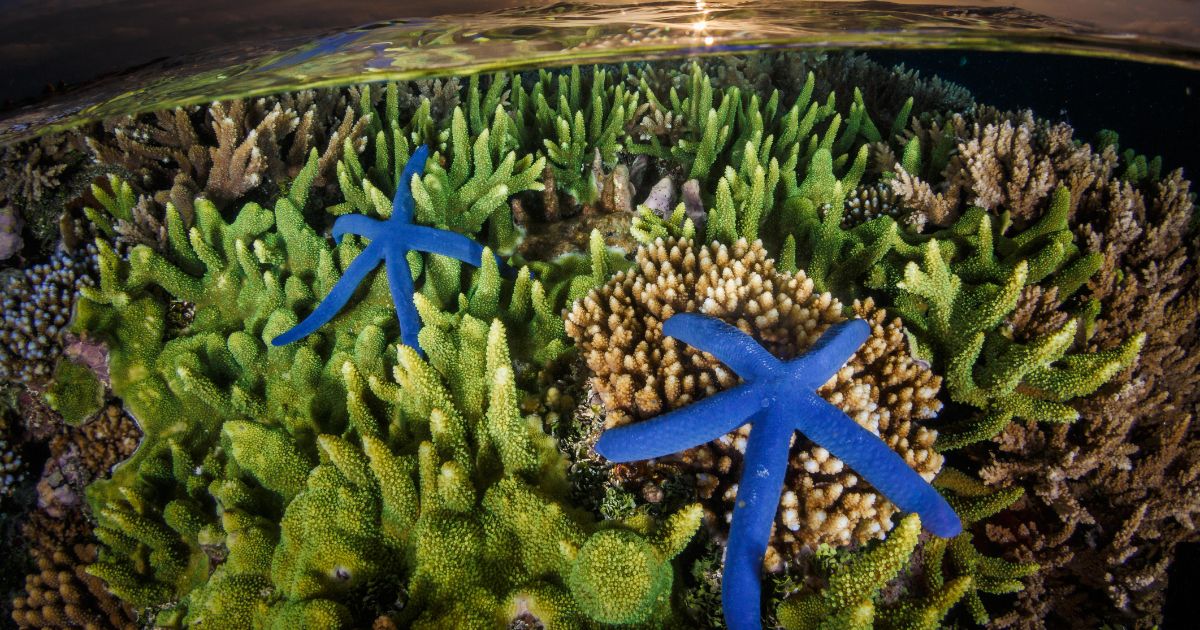By Dona Bertarelli and Sylvia A. Earle
As the Apollo 8 astronauts became the first humans to move into the vacuum of space, they looked back onto Earth, so lush and green in their mind’s eye, and understood—we live on a blue planet. At that moment Earth’s beauty—and vulnerability—were achingly apparent.
Our personal and deep connections to the ocean come from decades of experiences on and under marine waters around the globe. We know the currents, churning tides, and the crushing darkness of the deep ocean. We know that the greatest abundance and diversity of life is in the sea. And we share a profound respect and understanding of the extent to which life everywhere depends on the ocean—and how little time is left before we lose Earth’s greatest gift.
A healthy ocean provides innumerable and irreplaceable direct benefits to people and economies by regulating climate and weather, absorbing carbon, buffering coastal communities, and supporting livelihoods, and it also provides intangible serenity through spiritual, cultural, and emotional connections.
However, the ocean, covering more than 70% of Earth, is paying a steep price for acting as the shock absorber for human excess. Today, commercially exploited fish populations have declined to a fraction of their former numbers, marine waters are warming and becoming more acidic due to greenhouse gas emissions, and plastic is ubiquitous, found at the oceans deepest point and in the stomachs of albatross, whales, and people. All the while, momentum is growing to expand new frontiers for commercial exploitation of sea life, oil, gas, and pristine deep ocean systems for rare art minerals.
Hope and the opportunity to reverse this steep trajectory of decline still exists—but not for long. This week delegates from around the world will gather in Lisbon for the United Nation’s Ocean Conference. This sets a global stage for governments and ocean leaders to advance a science-based blueprint for replenishing our planet.
Scientists, coastal communities and over 100 national governments now support the goal to protect at least 30% of the global ocean by 2030—the target humanity must hit to secure the long-term health of the planet. Today, just 8% of the ocean is managed to some degree within marine protected areas (MPAs). And closer inspection of this figure paints an even more challenging picture—only 2.5% of the ocean is highly or fully protected by MPAs—the level protection required to achieve meaningful biological benefits.
In Lisbon, attendees must amplify this goal, and advance ambitious new national contributions toward this target. Such commitments would build on some of the tremendous progress achieved over the past year, including France’s largest fully protected area in the subantarctic waters of the southern Indian Ocean, an expansion of the world-renowned Galápagos Marine Reserve, and a trans-boundary commitment to protect rich and highly productive waters of the Eastern Tropical Pacific shared by Panama, Costa Rica, Ecuador, and Colombia.
Effectively and equitably protecting 30% by decade’s end will require courage by world leaders willing to forgo the short-term plunder depleting the planet to secure a sustainable and regenerative blue economy that benefits both people and nature. It will require the inclusion and leadership from Indigenous and local peoples and taking lessons from traditional ocean management approaches about what works and what does not. It will also require effective management of human actions, monitoring, and enforcement using innovative platforms that combine satellite technology with ground-breaking science; and, it will require long-term sustainable financing. All of these solutions are available, proven, and accessible.
Lisbon’s global stage must also turn an eye to the high seas—the daunting, blue expanse beyond national jurisdiction, which encompass nearly half of the world, two-thirds of ocean’s surface, most of its volume and most of Earth’s biosphere, the space occupied by life. Although seemingly impossibly isolated, the high seas are heavily exploited by international fishing fleets, many operating illegally. They also represent a frontier for a fast-evolving industry with designs on minerals associated with richly populated systems of life on sea mounts, hydrothermal vents and across large expanses of the deep sea floor.
Managing all the users of the ocean requires strong and collaborative international leadership on three fronts. First, the United Nations must complete and agree on a new high seas treaty supporting the effective protection of the “global commons.” Second, the World Trade Organization members must swiftly bring their recently signed treaty into force to significantly curb harmful fishing subsidies—the tens of billions of dollars that make damaging industrial fishing possible. Finally, a moratorium of at least ten years on deep sea mining by the International Seabed Authority will help ensure vital protection of the rich and diverse life of the deep ocean.
We have one planet, embraced by one blue ocean. If we are to adequately protect Earth’s most important ecosystem — our life support system — we must think holistically and inclusively. Our solutions must be effective, equitable, driven by science and ensure accountability. The UN Ocean Summit in Lisbon provides the perfect platform for our leaders and ocean champions to declare such an ambition to the world.
Dr. Sylvia Earle is an oceanographer, explorer, author, former chief scientist at National Oceanic and Atmospheric Administration (NOAA), founder of Mission Blue, and National Geographic Explorer at Large. Dona Bertarelli co-chair of the Bertarelli Foundation, Patron of Nature for the International Union for Conservation of Nature, United Nations Conference on Trade and Development Special Adviser on the Blue Economy, and the fastest woman to sail around the world.





